Exxon, the Climate and Senator Whitehouse
Air Date: Week of May 13, 2016
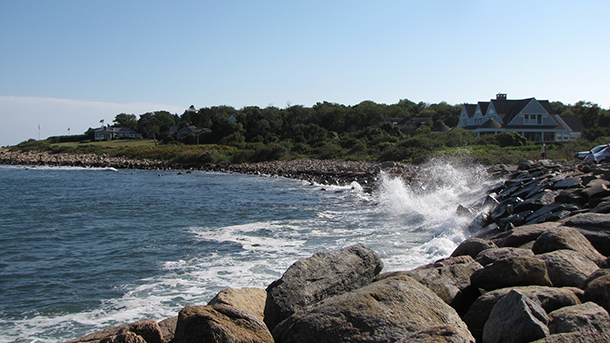
Senator Whitehouse represents Rhode Island, the “Ocean State”. Sea level rise is already presenting a threat to the state’s coastal areas including Narragansett Bay. (Photo: Christine Riggle, Flickr CC BY-NC-ND 2.0)
US Senator Sheldon Whitehouse [D-RI] chats with host Steve Curwood and discusses why he has risen more than 135 times on the Senate floor to alert his colleagues about climate change, and how the pending investigation into ExxonMobil’s alleged climate fraud has a precedent in litigation against the tobacco industry for its civil fraud and racketeering.
Transcript
[THEME]
CURWOOD: From the Jennifer and Ted Stanley studios at the University of Massachusetts Boston and PRI, this is Living on Earth. I’m Steve Curwood. Even when there was a Democratic majority in both houses, Congress failed to pass strong measures to address global warming. And since the Republicans took over, the situation has stayed the same, with many in Congress even questioning the science of climate change. But that has not stopped one Senator, Democrat Sheldon Whitehouse of Rhode Island, from taking the floor weekly to address his colleagues on the dangers of climate disruption, and the need to act. Sheldon Whitehouse joins us now. Welcome to Living on Earth.
WHITEHOUSE: Thank you. Good to be with you.
CURWOOD: Why are you so concerned about the climate?
WHITEHOUSE: Well, I'm from the Ocean state, and when you look at the oceans, 90-plus percent of the heat that we captured from all these greenhouse gases has been taken up by the oceans. So they're warming and you measure that with thermometers - it's not complicated to measure - and unless somebody's going to repeal the law of thermal expansion, when they warm they get bigger, and when they get bigger they rise against our shores, and we can measure 10 inches of sea level rise in Newport, Rhode Island, since the devastating hurricane of 1938. And at the same time that they're taking up heat, they're taking up carbon dioxide which chemically - unless you're going to repeal the laws of chemistry - causes them to turn more acid and we now have oceans that are acidifying at the fastest rate in 50 million years. And we can see that our species Homo sapiens has been on the planet about 200,000 years, 50 million is a long long time to go back to for your last example of when oceans suffered this sudden and devastating a change. So if you're from the Ocean state, just that ought to be enough to get your attention setting aside what is happening on the land.
CURWOOD: So why has Congress been unable to pass any climate change legislation?
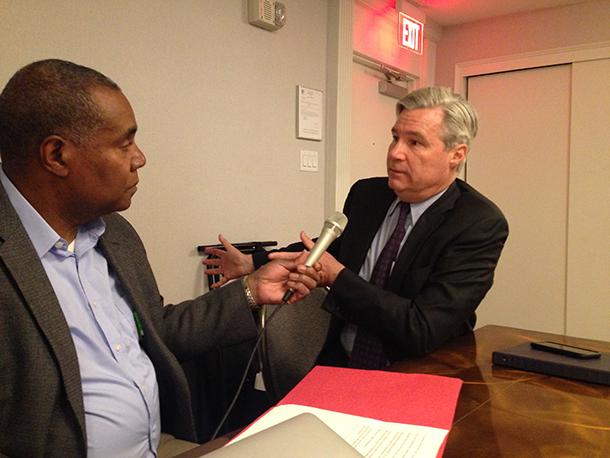
US Senator Sheldon Whitehouse (D-RI) (left) with LOE’s Steve Curwood. (Photo: Jenni Doering)
WHITEHOUSE: Two reasons: the first is that the fossil fuel industry has an enormous subsidy to defend and they're defending it through a very very powerful climate denial apparatus, and second, the Citizens United decision put unprecedented political artillery into their hands that they have used to murderous effect.
CURWOOD: Climate denial? What about the role of Exxon in this?
WHITEHOUSE: Exxon hss been at the heart of the climate denial operation. The core players are the Koch brothers, Exxon and sort of the lingering group from the tobacco denial operation and they've gotten more sophisticated and multifaceted since then. It almost seems quaint to think that Phillip Morris tried to hide behind the American Tobacco Institute. Now you've got the George C. Marshall Institute and the Heartland Institute and all these other things. So they've become more sophisticated, but it's a very powerful operation, and Exxon-Mobil has been at the heart of it.
CURWOOD: Now, I understand that with Senators Richard Blumenthal, Ed Markey, Elizabeth Warren, you've written to Exxon folks asking them about their financial support for climate denial. How has Exxon responded?
WHITEHOUSE: They have been I think, a little bit shifty about wanting to, on the one hand, extricate themselves from their previous outright climate denial positions, but at the same time they have not been very accountable about closing down the lobby efforts that they make in Congress that are still leaned hard over into full on climate denial. So the CEO of Exxon may say nice things at a Davos cocktail party about climate change being real and Exxon being interested in a carbon price. But down at the American Petroleum Institute where they lobby, they're telling people, "Don't believe that. You cross us and you're toast."
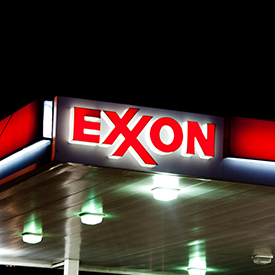
ExxonMobil’s own scientists informed its executives about climate change decades ago, says Senator Whitehouse -- and soon thereafter the company allegedly began funding climate denial efforts. (Photo: Thomas Hawk, Flickr CC BY-NC 2.0)
CURWOOD: Now, you're a former prosecutor you were Attorney General for the state of Rhode Island, you were US attorney for the state of Rhode Island, what you make of the investigations by the Attorneys General of New York state, Massachusetts, for the Virgin Islands, into Exxon the question of illegality in their denial.
WHITEHOUSE: Well, there's a precedent for it and a very good one which is the civil lawsuit that the department of justice brought against the tobacco industry for fraud about the dangers of that product, and the interesting news about that is that the Department of Justice won, and the case confirmed the proposition that corporate fraud is not protected by free speech or the First Amendment. Fraud is fraud and free speech is free speech, there is a line between the two, and by and large prosecutors and juries can tell them apart. So the pushback against that you've seen from a lot of the front groups and from that mouthpieces like the Wall Street Journal editorial page just try to reboot that lost argument and it may be something that fools people who are unschooled in this area, but any lawyer knowledgeable about this area knows that fraud is not protected by the First Amendment and the government's entitled to investigate it and if fraud is there, there should be consequences. And there's plenty of smoke around what the climate denial operation did to suggest that an investigation to see whether there's fire is justified.
CURWOOD: Specifically against whom is this alleged fraud being committed?
WHITEHOUSE: Well, it's against the general public. It has the specific purpose of trying to convince people that the question of climate change is unsettled when essentially no responsible scientist or scientific organization would say that. And the ultimate desire is to protect subsidies that the fossil fuel industry gets in the hundreds of billions of dollars by not being accountable for the cost that it causes, and this is a very powerful industry defending its turf basically for economic reasons and to hell with the rest of us. So that's an unfortunate corporate choice by them.
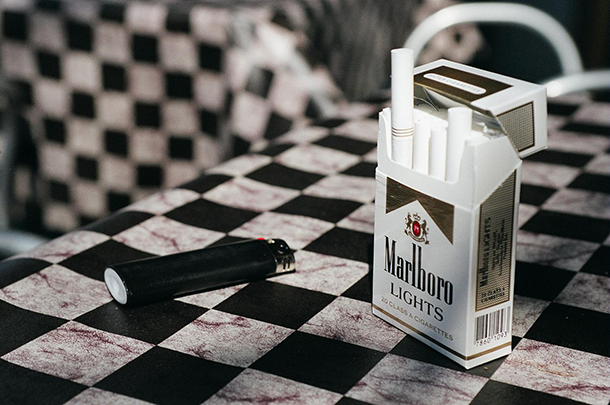
In 2006, Philip Morris was found guilty of civil fraud and racketeering for giving the impression that their Marlboro “light” cigarettes were a safer alternative to regular cigarettes. (Photo: Alejandro Giacometti, Flickr CC BY-NC-ND 2.0)
CURWOOD: Specifically, the Securities and Exchange Commission requires honesty in disclosures from companies about their activities. In your view as a former prosecutor, what chance is there that Exxon may have violated the criminal part of our statutes?
WHITEHOUSE: It would be think premature to say that, but I do think that Attorney General Schneiderman of New York feels on very solid ground pursuing them under the New York state securities laws for exactly that point. And you can go at it from a number of different ways. One is all the things they said that they knew were true when they knew climate change was a real problem because their own scientists were telling them that, and the other is the financial reporting that they continue to do right now, claiming that trillions of dollars of fossil fuel in the ground is still an asset of theirs, where we all know that if you actually burned all that fossil fuel you would completely wreck human life on this planet as we have known it in our 200,000 years of habitation of the planet. So you kind of can't have it both ways and they're trying to have it both ways, so just the valuations I think raise issue about whether they're being honest with their shareholders.
CURWOOD: So the New York State attorney general is using state investor protection laws. What about the United States attorney general? What about the federal laws really that are much bigger, stronger, and cover everywhere in the US?
WHITEHOUSE: Well, it was the Department of Justice that brought the tobacco litigation. I think the Department of Justice in that case followed a lot of litigation by state attorneys general. So it's not unusual for state attorneys general to take the lead before the Department of Justice is willing to move, but ultimately I think the most compelling event in turning around the public perception about the tobacco companies was when they were found to have committed fraud in a case brought by the United States Department of Justice in a decision by a United States District judge affirmed by the United States Court of Appeals. That's a pretty powerful stamp of validation that these guys were up to fraud.
CURWOOD: And if my recollection is correct it was really a racketeering charge, a civil racketeering charge.
WHITEHOUSE: It was brought under the civil component of the federal racketeering statute.
CURWOOD: I understand you've risen 135 times or more on the Senate floor to talk about the risk and reality of climate disruption.
WHITEHOUSE: A little more, 135 times in the time to wake up series that we've been doing weekly for all the weeks, now four years I think that when the Senate is session I give a speech every week.
CURWOOD: Why do you do this?
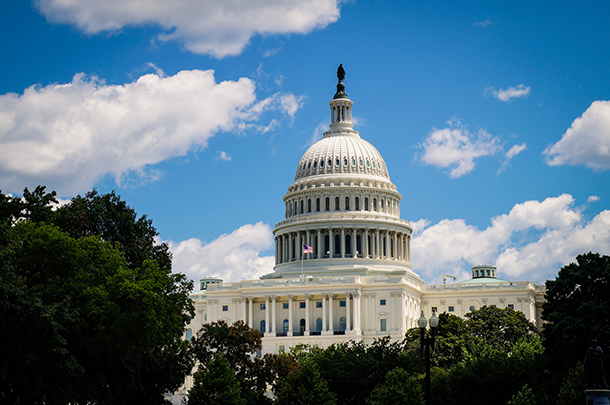
Senator Whitehouse has spoken on the U.S. Senate floor more than 135 times about climate change in his “Time to Wake Up” speeches. (Photo: Jeffrey Zeldman, Flickr CC BY-NC-ND 2.0)
WHITEHOUSE: Persistence. Chinese water torture. Droplets of water cut through rock in enough time. You know, it's hard to know what the example is. When I started doing this the Obama administration was refusing to even speak about climate change. The fossil fuel industry had the Republican Party thoroughly locked down in the wake of Citizens United and the environmental community was kind of in despair that Congress was even hearing that this was real. So I thought the least I can do is to like be a sentry out there every single week reassuring people that there's at least one voice that gets this is real, we need to do something about it, it's important, let's go.
CURWOOD: What kind of a difference has it made?
WHITEHOUSE: You know, I don't know. It's hard to assign causation to things but certainly between then and now there's been a huge turnabout in public perception. The Obama administration has engaged in very powerful and helpful ways, and the pressure is such that even fossil fuel company CEOs now know that they've got at least say the right thing about climate change and carbon pricing even if they're telling all their lobbying armies to continue to threaten anybody who crosses them.
CURWOOD: Talk to us about your views on getting a price on carbon. Is this something we should do, how much should it be, how should it get implemented?
WHITEHOUSE: It's absolutely something that we should do. The price on carbon that we have in the bill that I've filed is the price on carbon that the federal Office of Management and Budget has established. It probably should be higher than that but from a point of view of why create unnecessary fights, I'm willing to live with the OMB number. It has a number of values: one is that it's economy wide, it doesn't pick favorites, it doesn't have regulatory cost, or has very low regulatory cost. You can protect at the borders for trade with companies that don't have a similar one, and you can ramp it up and down as we meet or don't meet the goals that we have to protect the planet for more than a degree and a half of temperature increase.
CURWOOD: So, how much more time do we have left to get this right?
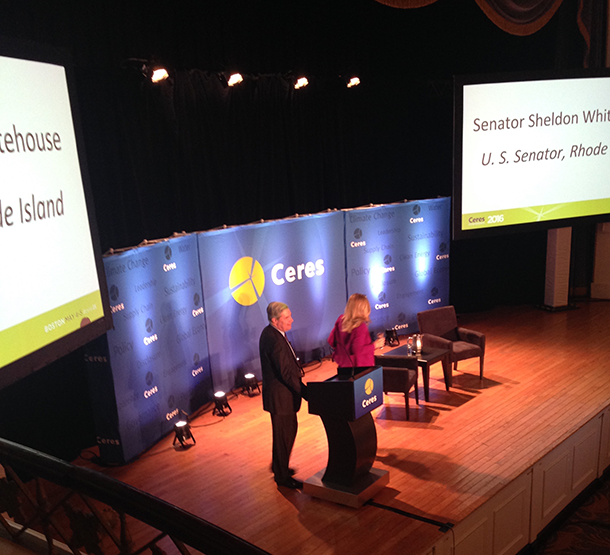
Senator Whitehouse recently spoke about the need for industry lobbying on climate change at the Ceres Conference 2016 in Boston, “Business Not as Usual: Sustainability in an Age of Disruption”. (Photo: Jenni Doering)
WHITEHOUSE: The slightly scary part of this is that we don't know. That we just don't know what tipping points are going to emerge and what points of no return we're going to pass. We might not recognize them until they happen, so we really need to proceed with all deliberate speed, and with a sense of urgency and mission to get this done because if we don't, we grew up looking at the group, that won the second world war as the greatest generation, our grandchildren will look back at us as a particular loathsome and shallow generation that just succumbed to the greed of a very small group of people because they were politically powerful and that would be a very unfortunate legacy.
CURWOOD: Before you go, Senator, this is the election season. In your view, if the Republicans take the White House, what are the odds of seeing climate progress, what are the odds of seeing say Exxon prosecuted for its alleged fraud here?
WHITEHOUSE: The odds of Republicans doing anything on climate I think are substantially less than of Democrats just because the way that the fossil fuel industry has operated in this has been basically to conduct a hostile take over of the Republican party and run out Republicans who disagreed with them and put their thumbs on Republicans generally. So it would be hard for them to undo that, but I would say even though that is the case, the public pressure, the scientific pressure, the facts that are emerging in senators' home states are creating an irresistible force that even that pressure ultimately can't stop. All it can do is slow it down. But like we were saying earlier, time is not our friend. It matters whether we get there sooner rather than later.
CURWOOD: Sheldon Whitehouse is the Democratic Senator from Rhode Island. Thank you so much, Sir.
WHITEHOUSE: Great being with you. I really appreciate the opportunity. Thank you very much.
Links
Senator Whitehouse’s “Time to Wake Up” speeches on climate change (136 and counting)
InsideClimate News: “Exxon and Its Allies Invoke First Amendment to Fight Climate Fraud Probes”
On Big Tobacco’s conviction of fraud and racketeering in 2006
Living on Earth wants to hear from you!
Living on Earth
62 Calef Highway, Suite 212
Lee, NH 03861
Telephone: 617-287-4121
E-mail: comments@loe.org
Newsletter [Click here]
Donate to Living on Earth!
Living on Earth is an independent media program and relies entirely on contributions from listeners and institutions supporting public service. Please donate now to preserve an independent environmental voice.
NewsletterLiving on Earth offers a weekly delivery of the show's rundown to your mailbox. Sign up for our newsletter today!
 Sailors For The Sea: Be the change you want to sea.
Sailors For The Sea: Be the change you want to sea.
 The Grantham Foundation for the Protection of the Environment: Committed to protecting and improving the health of the global environment.
The Grantham Foundation for the Protection of the Environment: Committed to protecting and improving the health of the global environment.
 Contribute to Living on Earth and receive, as our gift to you, an archival print of one of Mark Seth Lender's extraordinary wildlife photographs. Follow the link to see Mark's current collection of photographs.
Contribute to Living on Earth and receive, as our gift to you, an archival print of one of Mark Seth Lender's extraordinary wildlife photographs. Follow the link to see Mark's current collection of photographs.
 Buy a signed copy of Mark Seth Lender's book Smeagull the Seagull & support Living on Earth
Buy a signed copy of Mark Seth Lender's book Smeagull the Seagull & support Living on Earth

